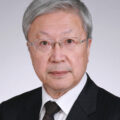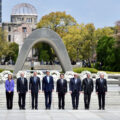Abe’s Tour of Europe Sets the Stage
In an article written before the G7 summit in May and the referendum on membership of the EU in the United Kingdom in June, Professor Endo Ken considers the immediate and potential impact of Prime Minister Abe’s recent meetings with foreign leaders in Europe.
Prime Minister Abe Shinzo made a round of calls on European leaders from May 1 to 7 this year. A longer agenda for the visit had been planned, but it had to be shortened due to the earthquakes in Kumamoto from April 14 on.
Regardless of the disaster contingency planning and the tight schedule, the Prime Minister had two major reasons for insisting on the round of calls.

Endo Ken, Professor of international politics in the School of Law at Hokkaido University
Firstly, to lay the groundwork for the Ise-Shima Summit (the G7 meeting) slated for May 26 to 27. Phrased like this, it sounds like a routine call, but the actual situation is far from it because of strong speculation that Abe would personally conduct negotiations with the leaders of the United Kingdom, Germany, France, and Italy (+EU) to increase opportunities for mobilizing fiscal policy by means of the G7 framework. Following the exposure of the limits of Abenomics, which is heavily dependent on monetary policy, adhering closely to the political strategy of his own administration (tax increases, elections) is an issue of the highest importance for the Prime Minister. Less acutely, he also hoped to press for a conclusion to the Japan-EU economic and strategic partnership agreements and to exchange his security concerns about the South China Sea with theirs on Ukraine.
Secondly, the face-to-face talks with Russian President Putin at Sochi were part of a long-standing goal to take the initiative with regard to the lack of a formal peace treaty in the seventy years since the end of the war and the return of the Northern Territories.
These policy objectives were hardly easy to achieve. Although the world economy is showing signs of a long-term downward turn, Germany has opposed fiscal action all along. Winning the consent of the United Kingdom is no easy matter amid recent signs of a bubble appearing in major cities even as the economy is finally back on track after several years of prioritizing fiscal restraint.
The negotiations with Russia over the peace treaty and the territorial issues were even more difficult. Since the crisis in Ukraine in 2014, Japan has joined the tail end of the sanctions against Russia causing tensions in the relations with the country. Senior Russian politicians have made repeated visits to the Northern Territories and pressed Japan to recognize both the anti-fascist nature of the Second World War and its implications for their territorial claims. On the other hand, keeping opposition to China in mind, Japan has made overtures to Russia in the hope of driving a wedge between China and Russia, which causes tensions with the United States instead.
Mixed Results
The results we r e mixed. First of all, where the objective of joint fiscal action by the G7 is concerned, Prime Minister Renzi, a long-time advocate of fiscal policy, repeated the necessity for such action at the joint press conference in Italy, the first stop on the tour. In France, a similar line was agreed with President Hollande. But, as expected, Chancellor Merkel in Germany did her best to hammer out a parallel route to structural reform while Prime Minister Cameron in the United Kingdom also pushed back saying that the economic and fiscal situations differ in each country.
With regard to China’s push into the ocean, which is the biggest geopolitical concern for the Japanese Prime Minister, Renzi said nothing at the press conference, with Hollande only referring to the need for mutual dialog and consultation, which stand in stark contrast to the shared strategic objectives stated with respect to Ukraine. In the United Kingdom, Cameron is in the middle of a battle to win a referendum for the British membership in the EU, and the Japanese prime minister made a statement in support. It hinted of pushing out the lifeboat for a friend in need, but when pressed about the issue of the South China Sea at the press conference, Cameron went no further than stating the need to find a solution to the conflict within the framework of international organizations and rules, and to abide by the United Nations Convention on the Law of the Sea. It is likely that the exchanges of opinion went further at the less formal meetings at Chequers (the country house retreat of the British Prime Minister), but the official statements were extremely restrained.
The “new approach” to Russia is to engender opportunities for negotiations through economic cooperation and exchanges of high-level governmental personnel rather than up-front demands from Japan for negotiations about the territorial issues. Abe will be visiting Russia again for the APEC Leaders’ Meeting in September, which, if it comes off, will mark the fourteenth time he has come face to face with Putin. His own visit to Japan is still pending, but efforts are continuing.
No concrete progress was made, but the key point is that (in the face of U.S. opposition) the Prime Minister of Japan, who is hosting the next G7 summit, went to meet the president of Russia, which is isolated and mired in negative economic growth because of the Ukraine crisis. It was an attempt to use summit diplomacy to keep alive the hopes of future negotiations about the peace treaty and the territorial questions by offering economic cooperation to alleviate Russian isolation. Seen in this light, the meeting was perhaps significant.
Now, Putin is not coming to the G7. The biggest hurdle will be whether or not the G7 leaders will issue some affirmative wording about fiscal policy and structural reform. Seeking for a more durable administration, Prime Minister Abe would like to use such a statement as leverage to push ahead with a proactive fiscal policy. Any supportive wording would imply that the round of visits in Europe carried some significance.
Whether or not we can expect more drama will become apparent in the next few weeks. Will the consumption tax be raised, will he call a snap general election on the same day as the Upper House elections, and if he wins these elections, will he embark on the long-sought constitutional reforms? There will be hints in the wording of the G7 summit declaration.
In short, in addition to being a foreign diplomacy drama, the Ise-Shima summit also marks a high point in domestic affairs for Prime Minister Abe.
Note: This article was written on 15 May 2016.
Reprint from The Japan Journal, July 2016 (Vol. 13 No.4), pp. 14-15.




